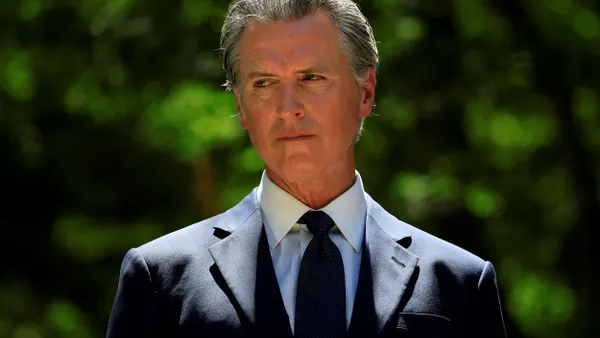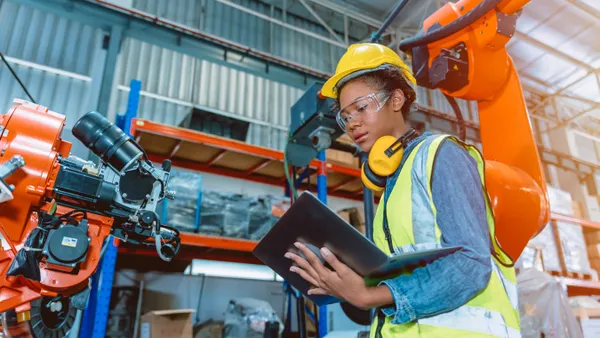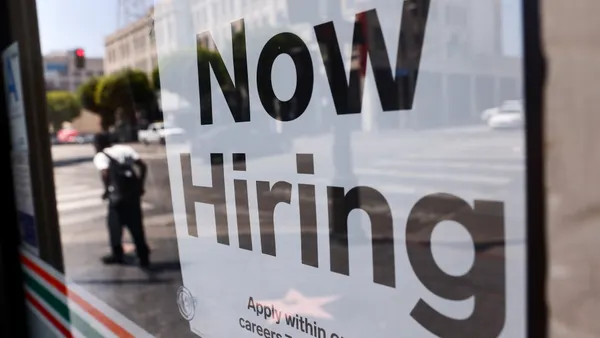Dive Brief:
- Pessimism among CEOs eased last month as détente in the U.S.-China trade war tempered worries that the highest tariffs since the 1930s will trigger widespread economic disruption, the Conference Board and Business Council said.
- In a ranking of risks, CEOs bumped tariffs from No. 1 to third behind geopolitical instability and cybersecurity, the Conference Board said, citing a quarterly survey conducted with the Business Council. Fear of recession within the next 12 to 18 months plunged from 83% in the Q2 survey to 36% last month.
- “CEO confidence recovered in the third quarter after collapsing in Q2, but fell short of signaling a return to optimism,” Stephanie Guichard, senior economist for global indicators at the Conference Board, said in a statement. “The improvement is a continuation of the trend seen after tariff disputes between the U.S. and China became less intense,” she said.
Dive Insight:
Risks from import duties set by the Trump administration have eased somewhat since April but still cloud the outlook for price pressures, the job market and economic growth, according to private- and public-sector economists.
“Tariffs are contributing to inflation,” helping to sustain price gains beyond the Federal Reserve’s 2% long-term target, St. Louis Fed President Alberto Musalem said Friday.
“It is likely that most of the impact of tariffs on inflation will be short lived and will fade once the tariffs work themselves from the economy,” Musalem said. “But there's a reasonable probability that there may be some persistence to inflation.”
Seven out of 10 CEOs said they face price pressures from suppliers, 64% blamed rising materials costs, 63% flagged technology and 47% cited wages, the Conference Board and Business Council said.
The share of chief executives planning to raise wages by 3% or more during the next year rose to 61% last month from 58% during Q2, according to the survey.
“As in previous quarters, most CEOs indicated no revisions to their capital spending plans over the next 12 months,” Business Council Vice Chair Roger Ferguson said.
“However, for a second consecutive quarter, the share of CEOs expecting to cut back investment plans was higher than the share expecting to upgrade them,” Ferguson said in a statement.
Trump administration tariffs — along with shifts in regulation, immigration and tax policies — have clouded the economic outlook this year and prompted companies to delay hiring and investment, according to Fed and other economists.
The National Association for Business Economics found in a survey last month that roughly one out of four companies (27%) plan to delay hiring or investment during the next six months.
“Companies are taking a more cautious approach to hiring and capital expenditures amid elevated materials costs and wages,” Ford Motor Company Global Chief Economist Emily Kolinski Morris said in a statement, referring to the survey.
The share of CEOs expecting to reduce the size of their workforce during the next 12 months rose to 34%, Ferguson said. The proportion has increased for five straight quarters.
“For the first time since 2020, CEOs planning to shrink their workforce exceeded the share looking to expand,” he said.
Roughly nine out of 10 CEOs plan to hold down costs by deploying productivity-boosting technology, the Conference Board and Business Council found. Eighty-nine percent of chief executives will seek to negotiate acceptable costs with suppliers, while 83% plan to upgrade workforce skills.
Only 19% of CEOs plan to absorb rising costs by trimming profits, and only 8% intend to cut research and development budgets, the Conference Board and Business Council said.















